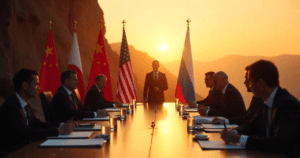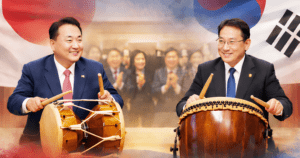In the bustling port city of Al-Andalus, around the 12th century, a young merchant named Yaqoob stood at the docks, watching as ships from distant lands unloaded their precious cargo. Silks from China, spices from India, and gold from Africa all passed through these waters, destined for the great markets of Europe. But before they could reach the eager hands of traders and nobles, there was one stop they all had to make—a meeting with the tax collector.
Watch the video here: https://thewashingtoneye.com/the-history-of-tariff-from-ancient-trade-to-modern-economics/
The official, an elderly scholar named Abu Tariq, sat behind a wooden desk covered with parchment scrolls, each detailing the required customs duties. He would check the weight and value of goods, consulting a well-organized “ta’rīfa”—a list of prices and taxes that determined how much each merchant owed before they could sell their wares.
This ta’rīfa was a carefully guarded document, a result of generations of economic wisdom passed down from the Islamic world’s greatest minds. It was, in essence, the lifeblood of trade, ensuring that the rulers of Al-Andalus maintained a steady revenue stream while protecting their own merchants from unfair competition.
Little did Abu Tariq know that the word he used daily—ta’rīfa—would embark on its own journey across continents, transforming with every port it visited.
The Spanish Connection
Fast forward to the 15th century. The last remnants of Muslim rule in Spain were fading, and the Spanish and Portuguese had set their sights on new horizons. Having absorbed centuries of Arabic influence, they carried not only knowledge of astronomy and mathematics but also an extensive vocabulary borrowed from their former rulers.
As Spanish and Portuguese explorers set sail for Africa, the Americas, and the Indies, they took with them the word “tarifa.” In the bustling port cities of Seville and Lisbon, customs officials still maintained tarifas, carefully regulating the flow of trade. It was during this period that European rulers began to realize something: tariffs weren’t just a way to collect money—they were a powerful economic weapon.
The Portuguese crown, eager to control the lucrative spice trade, imposed heavy tarifas on foreign merchants who wanted access to their colonies. The Spanish did the same in the New World, ensuring that only their ships could carry silver and sugar back to Europe.
The word, now embedded in the economic systems of Spain and Portugal, continued its journey across Europe, changing with each new language it touched.
A Word Evolves
By the 16th century, “tarifa” had become “tariffa” in Italian, where Venetian traders used it to describe the official price lists for goods passing through their ports. Italy, the crossroads of European trade, became the perfect gateway for the word to spread northward.
In France, where Louis XIV sought to strengthen his kingdom’s economy, “tarif” became a standard term for import duties. The Sun King’s finance minister, Jean-Baptiste Colbert, implemented strict tariffs to protect French industries, using them to shape economic policies that would influence Europe for centuries.
By the 18th century, the word had reached English shores, where it was finally anglicized to “tariff.” British merchants, ever eager to control global trade, applied tariffs not only to imported goods but also as a tool of empire. From India to the American colonies, tariffs became a means of economic control. In fact, one of the key causes of the American Revolution was Britain’s imposition of tariffs on tea and other goods—leading to the infamous Boston Tea Party.
The Word That Built and Broke Empires
As the Industrial Revolution swept across the world in the 19th century, tariffs became a battleground between free traders and protectionists. Britain, having become the world’s industrial powerhouse, began advocating for free trade, dismantling many of its own tariffs to allow goods to flow freely. The famed Corn Laws, which imposed tariffs on imported grain, were repealed in 1846 after fierce political debate.
Meanwhile, across the Atlantic, the newly formed United States took a different path. The young nation imposed high tariffs to protect its growing industries from European competition. This policy helped transform America into an industrial giant but also sowed divisions—many Southern states, dependent on agriculture and foreign trade, opposed high tariffs. By the time of the American Civil War, tariffs were a major political issue.
The Modern Tariff Wars
Fast forward to the 20th and 21st centuries, and tariffs remain as powerful as ever. During the Great Depression, the Smoot-Hawley Tariff Act of 1930, which raised import duties in the United States, triggered a global trade war, worsening the economic crisis. After World War II, nations sought to prevent such trade conflicts by creating organizations like the General Agreement on Tariffs and Trade (GATT), later evolving into the World Trade Organization (WTO).
Yet, tariffs never truly disappeared. From the US-China trade war to Brexit, governments continue to use tariffs as both an economic shield and a geopolitical sword. The same word that once appeared on Abu Tariq’s parchment scrolls in Al-Andalus now features in news headlines, debated by economists and world leaders.
Conclusion: The Word That Traveled the World
The journey of the word “tariff” is more than just linguistic—it mirrors the evolution of global trade itself. From its humble origins in medieval Islamic ports to the heart of modern economic policy, it has shaped empires, fueled revolutions, and influenced the course of history.
And so, next time you hear a world leader talk about tariffs, remember: this isn’t just economic jargon. It’s a word with a thousand-year history, whispered across markets, printed on tax scrolls, and stamped onto laws that have shaped our world.
Abu Tariq, sitting at his desk in Al-Andalus centuries ago, could never have imagined the power of his simple ta’rīfa—a word that would change the course of history.
















